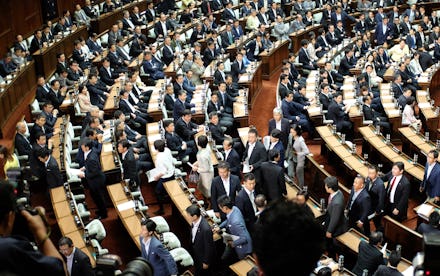Japanese Lawmaker Becomes First Ever to Take Paternity Leave

Parental leave can be an amazingly beneficial thing — but only if people take it.
Kensuke Miyazaki is making a statement by becoming the first Japanese member of parliament to take advantage of the country's generous paternity leave policy, the Guardian reported.
The 34-year-old Liberal Democrat plans to take 21 days off when he and his wife, who is also a member of parliament, have their first baby in February, the Asahi Shimbun reported, because he feels it's important for both parents to be present for the new child.
Japan has a famously generous policy of 12 months of paid leave for fathers, who can maintain about 60% of their salary, according to the Organization for Economic Co-operation and Development. That makes it one of the highest in the world, topped only by South Korea, with 52.6 weeks of paid paternity leave.
For comparison's sake, the United States has zero — individual companies, like Netflix, may offer paid paternity leave as a perk, but it's not mandated as a government policy.
That said, Japan may have a great policy — but only 2.3% of eligible fathers take advantage of it, as of last year.
Whether a father takes the leave allotted to him has a lot to do with cultural pressures, and no where was this more evident than with Miyazaki's decision. The BBC reported that the lawmaker has received plenty of backlash, including from his fellow legislators like Renho, arguably Japan's most powerful female politician.
Two weeks ago, when Miyazaki's news started circulating in Japanese media, she tweeted, "As members of Parliament, their job is not to go on paternity leave graciously with full-pay but to change the law so that ordinary citizens are protected."
The BBC reported that other critics also opposed Miyazaki's decision specifically because he's a publicly elected official, not a "worker," who the people rely on to be present and speak for them.
Whether congressmen can take parental leave is a question still up for debate in the United States, where Democratic senators introduced a bill in September to make six of the 12 weeks of parental leave available to federal employees paid.
"Our legislation will provide federal workers with six weeks of paid leave," said bill co-sponsor Sen. Brian Schatz (D-Hawaii) in a press release, "making sure no federal employee has to make the impossible choice between caring for a newborn child and putting dinner on the table."
The bill hasn't passed in the Senate yet, nor has Congress passed a bill for 12 weeks of paid family leave for all American families that was re-proposed in early 2015.
The concept of paternity leave isn't brand new, but it's coming up more and more in societal conversations about work-life balance and gender equality. Research is on parental leave's side: Paid leave has significant health benefits, and paternity leave specifically is good for women's professional trajectories.
Miyazaki is aware of the benefits of leave and said that he knows his decision is controversial, according to the BBC. But perhaps his bold step can encourage more men to take what's owed to them in Japan — and send a signal to the United States that paid paternity leave is something it might want to finally pass.
h/t Guardian